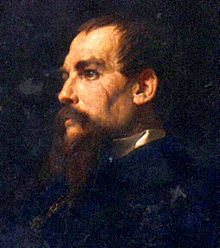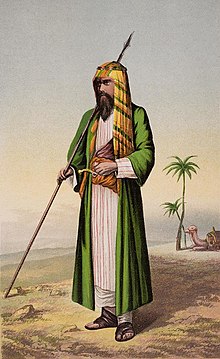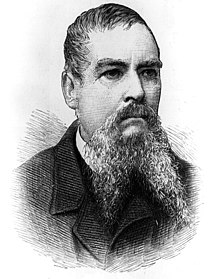Richard Francis Burton

Sir Richard Francis Burton KCMG (born March 19, 1821 in Torquay , Devonshire , according to other sources in Barham House, Hertfordshire , England ; † October 20, 1890 in Trieste , Austria-Hungary ) was a British explorer , officer, consul , translator , Orientalist and member of the Royal Geographical Society .
Life
Early years and education
Burton was born in Torquay , Devon , on March 19, 1821 at 9:30 p.m. In his biography he mentions his childhood home, Barham House, in Elstree, Hertfordshire , as the birthplace. He was baptized on September 2, 1821 at Elstree Church in Borehamwood , Hertfordshire.
His mother, Martha, came from the wealthy family of Richard Baker, a Hertfordshire squire . Joseph Netterville Burton, his father, was a Lieutenant General in the 36th Regiment of the British Army . His paternal grandfather, Edward Burton, was of Irish-English descent and, in Westmorland, Reverend of the Church of Ireland . Burton had two siblings, Maria Katherine Elizabeth and Edward Joseph Netterville, born in 1823 and 1824.
During his youth, the family made various trips, for example to the French Tours in 1825 . Burton received his early education from various private tutors, and in 1829 he entered the elementary school run by Reverend Charles Delafosse in Richmond Green, London Borough of Richmond upon Thames . During the following years, the family made further trips to France and Italy when Burton's affinity for languages came to light; so he quickly learned French, Latin and Italian, including some dialects, such as Neapolitan. He is said to have learned a basic knowledge of their language from a young Roma , which might explain why he learned Hindi and other Indo-Aryan languages surprisingly quickly in later years .
In the fall of 1840 he was accepted into Trinity College , Oxford . His fondness for languages motivated him to study the Arabic language ; he spent his free hours falconry and fencing . In 1842 he was guilty of a 'serious' violation of school rules by attending horse races with other students and allegedly having insisted on the school authorities that students should be allowed to participate in such events. Only disciplinary measures were imposed on his less provocative fellow students; Burton, however, was expelled from Trinity College.
Military time and research trips
Richard Francis Burton joined the British East India Company as an officer in the 18th Regiment of the Bombay Native Infantry in October 1842 . Burton learned Hindustani , Gujarati , Sindhi , Punjabi , Marathi and Persian over the next seven years . In 1849 he took a leave of absence, returned to Europe and then lived in Egypt for a long time. Here he learned Arabic , and after meeting Johann Ludwig Krapf, the idea arose to search for the sources of the Nile . In April 1853 he traveled to Medina and Mecca disguised as a Muslim pilgrim , which was forbidden for non- Muslims then and now. He then provided a detailed description of the city and the Hajj . In 1854 he arrived in Aden with John Hanning Speke together. They traveled to Somalia together .
On June 16, 1857, Burton started an expedition with Speke to East Africa to find the great lakes and the sources of the Nile. While preparing for the expedition, on Zanzibar , Burton learned Swahili and contracted malaria . From Zanzibar they marched first to Tabora , where they arrived on November 7th. On February 13, 1858, Burton and Speke discovered Lake Tanganyika , which Burton believed to be the source of the Nile. On July 9, Burton and Speke split. Speke discovered Lake Victoria on August 3 , which he in turn viewed as the source lake of the Nile, which led to a pronounced rivalry between the two. On March 4, 1859, Burton reached Zanzibar. When he finally arrived in London, Speke, who had arrived earlier, had already published his theories there and had been commissioned with a new expedition. Burton and Speke thereupon shared a bitter hostility.
In 1861 Burton married Isabel Arundell . She came from a very conservative upper class and married him against her parents' wishes.
In the same year Burton succeeded in a new expedition together with the German botanist Gustav Mann, the first ascent of the Cameroon Mountain . He explored the Niger Delta and Dahomey . After his return in August 1864, he again criticized Spekes theories of the Nile source. On September 15, 1864, there was therefore to be a hearing before the British Association for the Advancement of Science in Bath . However, Speke died the day before in a hunting accident. To this day it is not clear whether Speke committed suicide.
Burton visited Mormon prophet Brigham Young in newly formed Salt Lake City (later Utah ), traveled the world, and wrote a number of books. He later worked as a British consul in Fernando Poo (1861–1865), Santos (1865–1869), Damascus (1869–1871) and Trieste (1871–1890).
Burton died in Trieste early in the morning of October 20, 1890, of complications from a heart attack. His wife Isabel persuaded a priest to give the sacraments of death to Burton even though he was not a member of the Catholic Church, which some friends of Burton later reproached. Burton is buried under a marble, Arabic-style Bedouin tent with stained glass windows on one side in the Catholic Cemetery of Mortlake near Kew Gardens / Ealing in south-west London. His wife Isabel Burton was buried next to him.
Richard Francis Burton mastered a variety of oriental languages, translated many works, including the story collection Arabian Nights ( The Arabian Nights ), the Fragrant Garden and the Kama Sutra into English . As a researcher, he founded the Anthropological Society of London in 1863 and worked, among other things, on astro-cartography .
Awards and honors
- 1886: Accolade ( KCMG ) by Queen Victoria on February 5th
Works
- Sindh and the races that inhabit the valley of the Indus (London 1850)
- Goa and the Blue Mountains (London 1851)
- Falconry in the Valley of the Indus (1852)
- Personal narrative of a pilgrimage to El Medinah and Meccah (London 1855), e-book at http://www.gutenberg.org/etext/4657 , http://www.gutenberg.org/etext/4658
- First footsteps in East Africa; or, An Exploration of Harar (1856), e-book at http://www.gutenberg.org/etext/6886
- The Kasidah of Haji Abdu El-Yezdi
- The Lake Regions of Central Africa (1860)
- A Mission to Gelele , King of Dahomé (1864)
- Exploration of the Highlands of Brazil (1869)
- Letters from the Battlefields of Paraguay (1870)
- Zanzibar (London 1872)
- Unexplored Syria (London 1872)
- Ultima Thule (1875)
- Two Trips to Gorilla Land (1876)
- The Land Midian (1877), e-book at http://www.gutenberg.org/etext/7111 , http://www.gutenberg.org/etext/7113
- The Gold-Mines of Midian and the ruined Midianite cities (1878)
- The Land of Midian revisited (1879)
- A Glance at the Passion Play (London 1881), German translation "Oberammergau" (Hamburg 2010) with notes by Ilija Trojanow
- The Book of the Sword (1883)
- Book of the Sword, Verlag Chattoo and Windus , by Richard F. Burton, (1884), (scan version / full version, English)
- Vikram and the Vampire (1893), e-book at http://www.gutenberg.org/etext/2400
Translations
- Kama Sutra
- The Book of The Thousand Nights And A Night (1885-88)
- The Ananga Ranga is a 10-chapter commentary on Ratirahasya and was translated into English by Sir Richard in 1885.
- The Carmina of Catullus. Now first completely Englished into Verse and Prose, the Metrical Part by Capt. Sir Richard F. Burton, KCMG, FRGS, etc., etc., etc., and the Prose Portion, Introduction, and Notes Explanatory and Illustrative by Leonard C. Smithers. HS Nichols & Co. (printed for the translators; for private subscribers only), London 1894
- The Kasidah - translation into German verses by Menno Aden in: Ilija Trojanow, Nomade on four continents , Eichborn-Verlag 2007. Translation by Menno Aden with commentary by Attempto-Verlag Tübingen, 2007.
reception
Burton as a character in a novel
- Ilija Trojanow , Der Weltensammler , novel. dtv, Munich 2006, ISBN 978-3-423-13581-8 . (Trojanow has published a multi-part report on his trip to the sources of the Nile in the Frankfurter Allgemeine)
- Ilija Trojanow , nomad on four continents , Eichborn 2007. Trojanow's seven years on the trail of the world collector. A double voyage of discovery with original texts by Burton and the impressions, travel reports and thoughts of Trojanow on his journey.
- Burton plays one of the leading roles in the five-volume science fiction novel series Flusswelt der Zeit by Philip José Farmer . The novel takes place on a planet where all humanity has been resurrected. A river winds around this planet like a Midgard serpent biting its own tail. Here, too, Burton is looking for the sources of a river, the greatest of all time.
- Burton's books play a role in John Dunnings' The Bookseller's Secret (Roman, rütten & loening, 2007).
- In the curious case of the Spring Heeled Jack by Mark Hodder (Bastion-Luebbe, 2013) Burton plays a major role.
Reminiscences
- The film Land of the Black Sun , directed by Bob Rafelson in 1990, describes Burton's expedition with John Hanning Speke in search of the source of the Nile.
- In the movie Lara Croft: Tomb Raider , the mausoleum of Lara's father is modeled on that of Burton.
- John Greyson's film Zero Patience takes up the life of Burton in a satirical way by letting him work as a taxidermist at the Natural History Museum in Toronto and trying to present the thesis of the alleged "zero patient" who was the first to carry the HIV virus in the museum.
- A SATURN-class research spaceship in the Perry Rhodan novel series bears the name Burtons.
- In Arthur Conan Doyle's novel The Lost World (1912), Gladys, the friend of the young journalist Edward Dunn Malone, names Burton as the ideal type of a (her husband): “ ... above all, he must be a man who could do, who Could act, who could look Death in the face and have no fear of him, a man of great deeds and strange experiences. It is never a man that I should love, but always the glories he had won; for they would be reflected upon me. Think of Richard Burton! ”
literature
- Fawn MacKay Brodie: The Devil Drives. A Life of Sir Richard Burton. Norton, New York 1967.
- Isabel Burton : The Life of Captain Sir Richard F. Burton . Chapman & Hall, London 1893. 2nd volumes. (Digital copies: Volume 1 , Volume 2 )
- Alfredo Cordiviola: Richard Burton. A traveler in Brazil, 1865-1868. E. Mellen, Lewiston, et al. a. 2001. ISBN 0-7734-7645-8
- Byron Farwell: Burton. A biography of Sir Richard Francis Burton. Viking, Harmondsworth et al. a. 1988. ISBN 0-670-81333-8
- Jean François Gournay: L'appel du Proche-Orient Richard Francis Burton et son temps 1821-1890. Paris 1983. ISBN 2-86460-030-7
- Michael Hastings: Sir Richard Burton. A biography. Hodder and Stoughton, London 1978. ISBN 0-340-21852-5
- Dane Kennedy: The highly civilized man. Richard Burton and the Victorian world. Harvard Univ. Press, Cambridge Mass. u. a. 2005. ISBN 0-674-01862-1
- Mary S. Lovell: A rage to live. A biography of Richard and Isabel Burton. Little, Brown, et al. a. London 1998. ISBN 0-316-64385-8
- Frank J. McLynn: From the Sierras to the Pampas. Richard Burton's travels in the Americas, 1860-69. Century, London 1991. ISBN 0-7126-3789-3
- James L. Newman: Path without Glory - Richard Francis Burton in Africa. Potomac Books, Dulles VA 2010. ISBN 1-59797-287-8
- Christopher Ondaatje : Sindh revisited. A journey in the footsteps of Captain Sir Richard Francis Burton. 1842-1849, the India years. HarperCollins, San Francisco Cal 1996. ISBN 0-00-255436-4
- Edward Rice: Captain Sir Richard Francis Burton. The secret agent who made the pilgrimage to Mecca, discovered the Kama Sutra, and brought the Arabian nights to the West. Scribner, New York 1990. ISBN 0-684-19137-7
- Thomas Wright: The Life of Sir Richard Burton . Vol. 1 and 2. GP Putnam's Sons, New York 1906.
Web links
- Literature by and about Richard Francis Burton in the catalog of the German National Library
- The life of Sir Richard Burton , short biography of Burton
- Burtoniana.org All of Burton's works online as PDF
- Sir Richard F. Burton on the Web ( January 6, 2015 memento on the Internet Archive )
- Personal Narrative Of A Pilgrimage To Al-Madinah & Meccah: Volume 1: Digitized ; Volume 2: Digitized
- The University of Adelaide Library
- Spektrum .de: The Wrong Pilgrim September 12, 2018
Individual evidence
- ^ Lovell (1998), p. 1.
- ^ Wright (1906), Volume 1, p. 37 .
- ^ William Page: A History of the County of Hertford . Constable, 1908, pp. Volume 2, pp. 349-351.
- ^ Wright (1906), Volume 1, p. 38 .
- ^ Wright (1906), Volume 1, p. 52 .
- ↑ The Kasîdah Of Hâjî Abdû El-Yezdî by Richard F. Burton (1870).
- ↑ Burton Tomb Restoration Fund ( Memento of the original from August 28, 2006 in the Internet Archive ) Info: The archive link was automatically inserted and has not yet been checked. Please check the original and archive link according to the instructions and then remove this notice. , (English)
- ↑ Burton's translation of Ananga Ranga (English)
- ^ Arthur Conan Doyle: The Lost World. Chapter I.
| personal data | |
|---|---|
| SURNAME | Burton, Richard Francis |
| BRIEF DESCRIPTION | British explorer, translator, orientalist |
| DATE OF BIRTH | March 19, 1821 |
| PLACE OF BIRTH | Barham House, Hertfordshire , England |
| DATE OF DEATH | October 20, 1890 |
| Place of death | Trieste |

